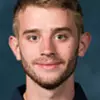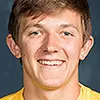
In the Spotlight: Tony Smoragiewicz
1/22/2016 12:00:00 AM | Men's Track & Field
Jan. 22, 2016
Tony Smoragiewicz has seen a lot in his four years as part of the Michigan cross country and track and field teams, but he's never seen what he saw last weekend, when seven U-M milers set new PRs at Vanderbilt's Commodore Invitational, led by Mason Ferlic, who recorded the top time in the nation. Smoragiewicz recorded a No. 1 time himself at 3,000 meter in a race that was paced by Ferlic, and his new PR marked a 19-second improvement over his previous career best. Both U-M distance athletes are also aerospace engineering majors and even have a class together. Smoragiewicz stopped by 'In the Spotlight' before U-M heads off to Notre Dame this weekend (Saturday, Jan. 23) to discuss his last performance, life as an aerospace engineer, and his history and future as a triathlete.
Q. You set a 19-second PR last weekend. Did you think you had that kind of time in you, based on your expectations heading to Vanderbilt?
A. Going into the meet, I thought 8:10 was going to be a stretch, so I really didn't think I was going to run as fast as I did. I also wasn't sure what kind of competition was going to be there. Alabama, Auburn and a few other schools were there but they are not necessarily powerhouse distance programs. Having Ben (Flanagan) and Mason (Ferlic) there set up the race perfectly -- I didn't have to do any work at all, just sit on them. Going into the meet, our goal times were reaching like 8:08 at the fastest. I just kind of sat in there and hit those paces right on ... and over the last two laps made up the difference and was able to go 8:02.
Q. Have you ever had Mason or Ben pace you before? What was it like running off them?
A. I've probably paced more races than races I've been paced in. But it makes the race a lot easier; you don't really have to focus on hitting splits. Someone else does the hard work and you just go along for the ride.
Q. Seeing what Mason, Ben and the milers did earlier in the meet -- setting seven PRs -- how much energy did that bring you and Aaron (Baumgarten) for your race?
A. That mile race was amazing. It was almost amazing as cross country Big Tens, when we won. Seeing all those guys come through with PRs was incredible; I didn't believe any of that was possible and I don't think anyone thought we were going to have PRs like that going into the weekend. To see that was awesome and super motivating to watch.
Q. The Commodore Invitational meet last weekend was your first look at other D1 competition this year and you were able to race against a few pros as well. What was that experience like as far as a real season opener?
A. It was cool to have a few pros in the field. Having that caliber of competition is great, especially on the last lap when you need that push. I was hoping it was (Aaron) Baumgarten trying to catch me and out-kick me at the end, but it was actually that pro, and he caught me down at the end.
By going to Vanderbilt, I think everyone wanted to run fast but mostly this was a rust-buster. There were certainly some good schools there, but it wasn't like the competition we're going to find at Meyo or Iowa State (later this year) so we were just hoping to get in there and get back to Ann Arbor to keep training with a good performance under our belt.
Q. How did you begin competing as a triathlete, and how much did your father (Jim, Maine, 1975-79) and your brother (Tyler, South Dakota State, 2009-10) being collegiate swimmers impact your athletic career as a whole?
A. Because of them, I actually started out as a swimmer, too. I started swimming when I was eight years old and ended up getting into running doing things like the mile test in P.E. I ended up liking running and felt I was pretty good at it, so I ended up pursuing it more on my own, but my dad and my brother were definitely part of motivation to get involved in triathlons. My brother has done a couple of triathlons, but he started doing them after I did.
The first triathlon I was going to compete, I was probably 11 at the time and it was supposed to be a relay with my dad. My dad was going to swim, I was going to run and we had a friend who was supposed to bike, but he bailed at the last minute. My dad was like 'How about you just do the whole thing?' and I said 'Sure, I guess so.' After that I was hooked.
Q. How has Coach Sullivan supported your eventual goal of returning to triathlon competition?
A. I was definitely more focused on doing triathlons my freshman and sophomore year at Michigan, and one of the main reasons I came here was that (Coach Gibby) was very supportive of my cross-training, because it had been where all my training came from before. They didn't want to just ramp me up to 100 miles a week, or I'd probably get injured. When Coach Sullivan came in, I had taken a little break from triathlons because it was just too hard to do them with school and running, all at the same level, compared to high school, but he was definitely still supportive.
I'm really not training for triathlons right now -- I'm entirely focused on running, but I still have a little cross-training involved. I'll get in the pool for a half-hour or so or I'll take a spin on the weekend. After this year, I plan to get back into triathlons and it's something I'm looking forward to a lot. I'm starting to get that itch for it again. The World Championships were in Chicago this past year, so I drove there with Micah Beller and Scotty Albaugh and it was a blast watching that. I was really wishing I was in the race when I was watching.
Q. What has this year been like in the world of aerospace engineering? What do you have planned for the near future?
A. I am in a graduate-level class with Mason (Ferlic) called Applied Aerodynamics for Motor Vehicles. It's a class with a year-long project and one of the things that Michigan has that a lot of other engineering programs don't offer is its applied labs. In Aero 205, Aero 305 and Aero 405, the labs are applied more towards manufacturing. In other classes, you may say 'this wing design will generate this much lift' but you have no idea how to build the wing or the aircraft. In Aero 205 we built a hovercraft from scratch. You design it on a computer, make a mold, use microcontrollers to control it and get access to laser cutters and 3-D printers. Having access to that kind of equipment is part of what separates Michigan's engineering program.
I have one more semester after this spring, and I'm out of cross country eligibility, so I'm going to take the fall off and do an internship beginning when track season ends and going through December, and then come back for the winter track season. I was able to make a lot of connections through triathlons and by knowing guys at USA Triathlon, so the networking has been great and I'm hoping they can continue to help me find the right position.
• Previous Spotlight: Joe Ellis
Communications Contact: Chad Shepard










